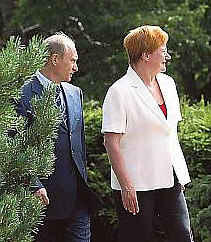8030 young Europeans between the age of 15 and 25 have been interviewed face-to-face: What do you think about politics? How do you see your opportunities in participation? Do you believe in success of such your activities?
"Political Participation of Young People in Europe - Development of Indicators for Comparative Research in the European Union" (EUYOUPART), this was the title of a study undertaken in 2003 and 2004. The results were recently published.
The wide spectrum of participating countries (Austria, Estonia, Finland, France, Germany, Italy, Slovakia, United Kingdom) contributed to the identification of relevant and valid indicators for young people's involvement in politics.
As main findings and tendencies the authors of the study listed the following:
"The interest in politics among the interviewed youth varies greatly. The most interested youth live in Germany with 51%, whereas young people in the UK (30%), Estonia (29%) and Slovakia (28%) are least interested. Italy comes second with 43% closely followed by Austria with 42%, and France and Finland rank next with 36% and 35% respectively.
The study clearly shows that a majority of young people is not interested in politics (37% interested vs. 63% disinterested in total). This study, however, gives rise to the hope that the young Europeans´ interest in politics might increase with the age. The overall majority believes that voting is the most effective form of political participation, and a comparatively high percentage also makes use of their right to vote.
Although the European youth shows little trust in political parties, many feel close to a certain party. NGOs seem most trustworthy to the youth, they gain more and more importance. The young people believe working for NGOs to be more effective than working for political parties. The youth´s perception of the future, however, differs widely: whilst young Estonians prove themselves to be optimists and their peers in the other participating countries have a mostly positive picture of their future, the Austrian and German youth fears deprivation and has an overall pessimistic attitude.
Finally, there is to say that whilst the youth shows an increasingly more critical attitude towards the prevalent political system, they still make use of their participative rights and duties within the representative democracy. As a social and political form of expressing their opinion, protest is becoming increasingly important for them. New social movements and new political organisations are well considered and are more attractive than the traditional ones. Participation in these new forms is growing."
Single country reports are ready for download (PDF-files) at the Website of German Youth Institut.
Austria
Germany
Slowakia
Finland
Estonia
Italy
France
United Kingdom
25. August 2005
5. August 2005
Halonen defends NGOs and Baltic Countries

Halonen defends Baltic Countries at press conference with Putin
source: HELSINGIN SANOMAT, Friday 5.8.2005
President Tarja Halonen gave an exceptionally strong defence of Estonia and Latvia during an outdoor press conference with Russian President Vladimir Putin at the Finnish President’s summer residence Kultaranta in Naantali.
Putin had lamented what he saw as the poor treatment of Russian-speaking minorities in the Baltic Countries. Halonen said that the legislation of Estonia and Latvia are acceptable, and that she would have hoped that Russia would have ratified the border treaties Estonia and Latvia.
There was also some disagreement on the roles of non-governmental organisations. A few weeks ago Putin hinted that various Russian environmental organisations had received funding from Finland to prevent Russia from building oil terminals on the Gulf of Finland.
At a press conference late Tuesday morning, Putin said that he takes a positive view of cross-border cooperation of NGOs - with certain reservations.
"I oppose the financing of political activities... I oppose the use of environmental protection as a means of competition", Putin said.
President Halonen saw the new sewage treatment plant in St. Petersburg, and the Vuosaari Harbour in Helsinki as good examples of what can be achieved by cooperation between states and among NGOs.
"Naturally it is not possible to co-opt the NGOs, nor is it a good idea to try to do so, but friendly support, also on the side of government, for the activities of such organisations is part of today’s Europe", Halonen said.
Putin said that he hoped that Halonen could attend the opening of the new sewage treatment plant in St. Petersburg in September. Halonen said that she probably would attend.
In spite of their disagreement on certain issues, both presidents insisted that relations between Finland and Russia are in good shape.
"A desire to cooperate was the clear message", Halonen said, summing up the significance of the visit, after seeing her guest off to Turku Airport on Tuesday evening.
Abonnieren
Posts (Atom)






